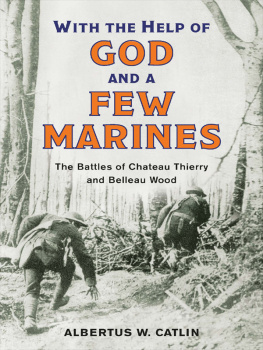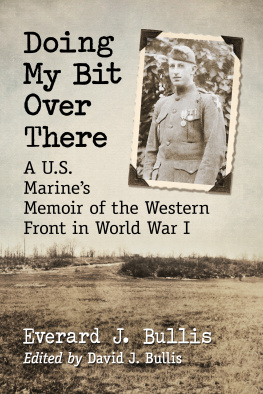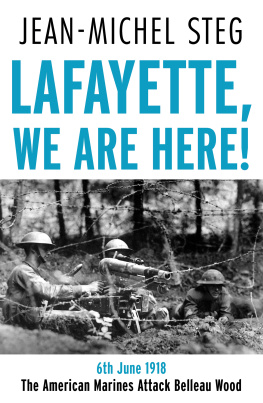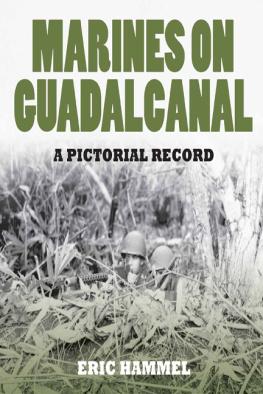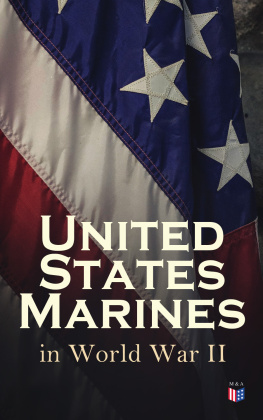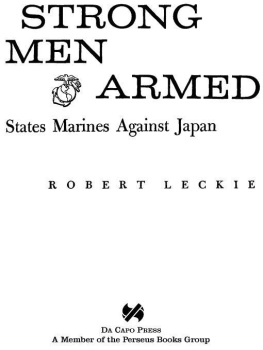WITH THE HELP OF GOD AND A FEW MARINES
CHAPTER I
WHAT IS A MARINE?
SINCE it appears that I am fated for an interval to lay aside the sword and take up the less congenial pen, I should prefer to begin at once with the thing that is uppermost in my mindthe story of the United States Marines in France. So fresh in my memory are those days in the trenches and the dark, moonless nights, pregnant with we knew not what possibilities, when the boys stole over the top on their first patrol duties. How eagerly, how anxiously we watched them, as a mother watches the first steps of her child, to discover whether they would face the music and do the job as a Marine should. We knew they would, but still we watched, and when they came back with what they went for, we breathed deep and faced the next task with confidence.
It was in those days that good American blood was spilt out there in No Man's Land, in the midst of the barbed wire and the lurking menace. Welooked upon our dead, and had the Hun known, he might well have trembled then.
I recall so vividly those busy days in camp, and the spirit that seemed to be loosed when the great call came; the long, forced ride on camions through the little, smiling villages, where the good French people lined the streets, waving American flags and throwing flowers at us; the tense, electrical feeling in the air when at last we knew that we were face to face with the victorious Prussian, and the awful, earnest, exultant moment when we went in to fight. And, waking or sleeping, I can still see before me the dark threat of Belleau Wood, as full of menace as a tiger's foot, dangerous as a live wire, poisonous with gas, bristling with machine guns, alive with snipers, scornfully beckoning us to come on and be slain, waiting for us like a dragon in its den. Our brains told us to fear it, but our wills heard but one command, to clean it out, and I can still see before my very eyes those waves in the poppy-spattered wheat-field as the steady lines of our Marines went in.
Those are the things that surge to the tip of my pen, but I have first, I feel, another duty to perform. I must tell something of the men who did this glorious thing and of the spirit that drove them on.
A fight is a fight, and few red-blooded men can resist the thrill of it, but it is not my purpose to glorify a fight nor to sing the Song of Hate. The Marine fights because fighting is the immediate and essential means to an end. He trusts implicitly the judgment of his superiors that the end justifiesthe means, not with the blind trust of the docile German, but from a well grounded and well understood principle. For a hundred years and more the Marines have been called upon when there was a critical need for action, and they have learned to take the need for granted and to act forthwith. They have never been deceived and they never hesitate. That is part of their creed.
It is because they have a creed that this narrative is written. Perhaps it is a creed that all men might follow with profit; we like to think so. The American Marine fights as well as any man on earth, and his fighting is worth writing about if any fighting is, but it is the thing back of his fighting that counts. There are significant, fundamental things that mean more in the philosophy of human and national life than even the taking of a stronghold and the blocking of an advance.
Who are these Marines? A bare thousand of them challenged death in Belleau Wood with the same spirit that drove on the Six Hundred at Balaklava. What sort of man did this thing? Where did he come from? What made him fit to go in with the first and bear the brunt while the rest of America was getting ready to make war on Germany?
In the first place, the Marines were ready, as no other group of American fighting men, with the exception of the Engineers, was ready. I think I can say this truthfully and without disparagement to any other branch of the service. Our problems were perhaps not so serious as those of the Army.I know something of their difficulties, for we were billeted close to the Ninth and 23rd Infantry in France during the spring of 1918. The Marines, though the Corps had been greatly expanded, had smaller numbers to handle, and we believe that our system of training was more highly perfected. Also, we had a certain advantage in personnel, both in men and new officers, as I shall show later on.
At the outbreak of the war the Army organization underwent radical changes. Not only were new regiments formed, but the numbers were changed from 1,000 to 3,600 men to a regiment. The old regiments were broken up so that the seasoned soldiers might serve as nuclei for the new ones, and they had to be spread out so thin that there were only about 300 of them to a regiment, or some 8 per cent. Moreover, it was thought best to hold the National Guard regiments together, so that the regular Army had to depend for its enlargement upon volunteer enlistments and a forced recruiting campaign. When this did not suffice, the Army was compelled to fill its ranks with volunteersnot picked menfrom the draft. This created a tremendous problem in the matter of training, the majority of the regular Army being nothing more than raw recruits, and it is no discredit to them that they did not turn at once into efficient troops.
As will be seen later, the larger part of our expeditionary force of Marines was also composed of new men, but their training began at once undermore favourable auspices. At Quantico, and later in France, they were drilled without let-up by experienced officers of the Marines. Then came participation in trench warfare, and one year after the United States had declared war, every one of those rookies had been converted into a died-in-the-wool Marine, while the Army was still making soldiers.
I make these statements in no spirit of criticism or invidious comparison, but simply to show, if I can, why the Marines were the ones chosen to go in first. Whatever the reason, they were ready first. It is part of the history of which they are so proud that they have nearly always been sent in first, because it is a fundamental part of their creed to be always ready. Their mottoes are First to Fight and Semper Fidelis.
These are days of enormous armies and organization on a tremendous scale, but small numbers do unquestionably make possible a closer human relationship, and that, in our experience, means increased confidence, a more effective discipline, and esprit de corps. The Marines have always been, comparatively speaking, an organization of small numbers; those who have read of their world-wide achievements in the past perhaps do not realize how small. Previous to the Spanish War the entire Corps was but half the size of a modern regiment, and the forces which so often brought order out of chaos in turbulent lands and put to rout armies of rapacious revolutionaries were few in numbers though mighty, like a squad of New York policemenquelling a riot. Americans have come to take it as a matter of course that a Marine should be able to do the work of ten ordinary men, and the Marines have come to that belief, too.
Numbering only 1,800 at the outbreak of the Spanish War, the Marine Corps was steadily enlarged until, in 1918, there were nearly 60,000 Marines in the service or in training. Though still a small unit, as modern military figures go, it will be seen that the Corps has been obliged to absorb a large percentage of increase, most of it since the United States joined in the Great War, and it may be well to note that, as it stands to-day, the Corps is more than twice the size of the United States Army at the outbreak of the Spanish War. And this increase has been accomplished without any depreciation in personnel. The Marines, all through their forced war-time recruiting, have maintained their high standards and have consistently rejected all applicants who were not of the first calibre.

